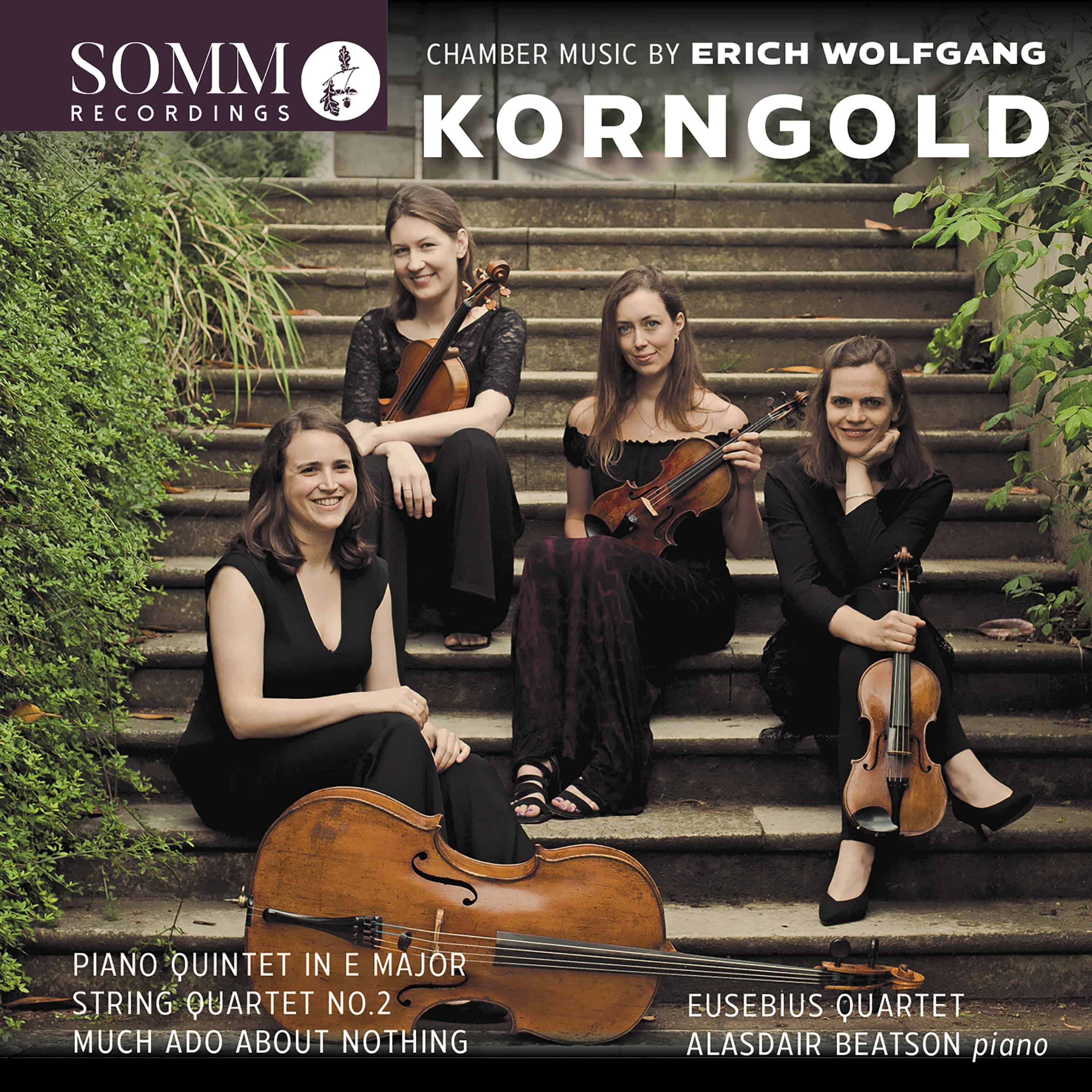SOMM Recordings throws new, invigorating light on the Chamber Music of Erich Wolfgang Korngold, performed by the Eusebius Quartet and pianist Alasdair Beatson.
Hailed by musicologist Nicolas Slonimsky as “the very last breath of the romantic spirit of Vienna”, Korngold’s stellar beginnings in Europe’s concert halls and opera houses were later overshadowed by his success in America where his soaring symphonic signature forged the template for the Hollywood soundtrack.
BBC Music Magazine January 2022 Recording of the Month!
But, as Korngold authority Brendan G Carroll notes in his informative booklet essay, the composer’s “relatively small body of chamber works… is no less impressive and actually offers a succinct distillation of his style and voice, often to considerably profound effect”.
The earliest work here is the string quartet arrangement of the suite drawn from his 1920 incidental music to Shakespeare’s Viel Lärmen um Nichts (Much Ado About Nothing). Its glowing Intermezzo is heard in the world premiere recording of Tom Poster’s sumptuous new arrangement.
The following year’s Op.15 Piano Quintet was composed shortly after Korngold’s opera Die tote Stadt (The Dead City), and, Carroll notes, “its flamboyant, heroic melodic style owes much to the residual influence of that epic score”.
The Op.26 Second String Quartet from 1933 “is one of the most intensely ‘Viennese’ works Korngold ever wrote”. The jolly, bubbling humour of its opening gives way to a rich, expansive Larghetto before concluding with a spirited hymn to that most Viennese of dance forms, the waltz.
Praised as “excellent” by The Sunday Times, the Eusebius Quartet was formed in 2016 and is making its debut on SOMM Recordings.
Alasdair Beatson’s previous SOMM releases include his enthusiastically reviewed recording debut, coupling Schumann, Grieg, Brahms and Berg (SOMMCD 086), and a Mendelssohn recital (SOMMCD 104) hailed by Classic FM for its “highly sensitive playing of rare insight”.
On This Recording
-
Piano Quintet in E major, Op.15ab
- I. Mäßiges Zeitmaß, mit schwungvoll blühendem Ausdruck
- II. Adagio: Mit größter Ruhe, stets äußerst gebunden und ausdrucksvoll
- III. Finale: Gemessen, beinahe pathetisch - Allegro giocoso Viel Lärmen um Nichts (Much Ado About Nothing), Op.11a
- I. Mädchen im Brautgemach (Maiden in the Bridal Chamber)
- II. Holzapfel und Schlehwein (Doberry and Verges)
- III. Gartenscene (Intermezzo) arr. Tom Poster ab*
- IV. Mummenschanz (Masquerade) String Quartet No.2 in E-flat major, Op.26 a
- I. Allegro
- II. Intermezzo - Allegretto con moto
- III. Larghetto - Lento
- IV. Waltz (Finale) - Tempo di valse
b Alasdair Beatson * First Recording
Reviews:
“The Eusebius Quartet open the current album in partnership with pianist Alasdair Beatson in Korngold’s early, luxurious-textured Piano Quintet in E – composed in 1921 simultaneously with his String Quartet No 1, shortly after the completion of his opera Die tote Stadt. … A four-movement orchestral suite followed but it wasn’t until 2012 that the unpublished manuscript of a string quartet version was discovered, covering just three of its movements. This again is clearly Viennese fare, translating charmingly well into concert music even in its most programmatic moments; and in these particular readings, even Dogberry and Verges’s drunken march sounds decidedly less spiky and more refined than it often does. The Eusebius also offer a bonus, having commissioned pianist Tom Poster to arrange for them the missing dreamy Intermezzo movement, which they glide through with clear, slender-toned pleasure.… what the Eusebius deliver here is convincing and stylish.” —Charlotte Gardner, Gramophone
“The Eusebius Quartet and Beatson bring this heady score all the intensity it deserves, their lavish tone conjuring quasi-orchestral colours, sensitive to every twist of the rubato-laden canvas (and there are many). It’s extreme music, its heart unfashionably yet gloriously on its sleeve, and the ensemble performs with real sincerity, wisely adding no affectation. The musicians seem to feel the music just as it is, complex on the surface, but direct and straight from the heart. A warm, glowing clarity about the recorded sound is appropriate enhancement. … in 2012 an unknown string quartet version of three [Much Ado About Nothing] movements in Korngold’s writing turned up in an auction. This is its first recording, with assistance from Tom Poster, who made the arrangement of the missing Intermezzo. Again, the Eusebius Quartet takes the music on its own terms, performing it with affection and high spirits in droves. … Sometimes it’s hard, listening to the Eusebius here [in String Quartet No. 2], to believe that there are only four musicians playing. … their full-blooded yet flexible tone to their intelligent handling of the ebb and flow, they offer a joyous feast of Korngold at his finest.” —Jessica Duchen, BBC Music Magazine – Recording of the Month





